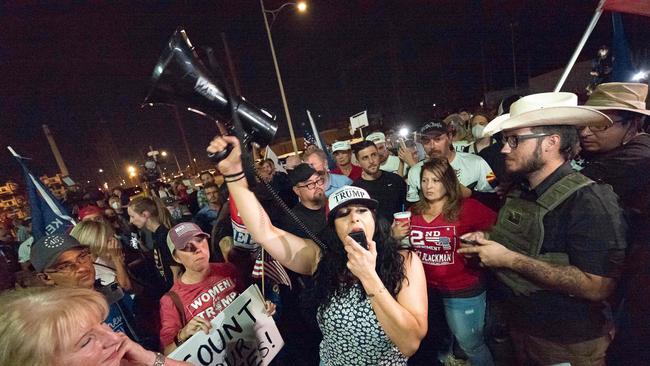US election 2020: People speak but pundits don’t hear
The Australian journalist who most accurately reported the US election was Sky News’ Annelise Nielsen.

Brooks is not a Trump supporter. Neither is he a leftist. He is intellectually honest enough to say many American opinion leaders, and much of the media, fail to understand the country in which they live. That’s why the predicted Democrat wave of support failed to prevail across the US on Tuesday.
The US presidential election outcome is close and may not be finalised for some time. Even if the Joe Biden-Kamala Harris team takes the White House, the Democratic Party has not attained a Senate majority and lost seats to the Republicans in the House of Representatives.
Brooks’s point is that he and his colleagues failed to pick the mood of the American nation. Despite COVID-19 and the resultant recession, along with a hostile media, Donald Trump performed better than most commentators predicted.
The reason Trump did unexpectedly well turns on the fact that he and his supporters know Middle America outside New York, Chicago and Los Angeles better than the commentators do. This is especially the case with those in Washington. In the District of Columbia on Tuesday, Biden obtained 93 per cent of the vote to Trump’s 5 per cent. Yet across the nation Biden appears to have 50 per cent of the popular vote compared with Trump’s 48 per cent. That’s a huge discrepancy. And that’s how politically isolated the US capital is.
On Monday, former ABC presenter Emma Alberici tweeted: “Given all of this, why are people voting for Trump? Honest question.” Well it’s certainly an honest question, and a revealing one at that. Alberici, like many commentators, does not understand why about half of Americans support Trump. Believe it or not, they agree with his policies across a range of issues, including economic protectionism, border security, the Middle East, climate change, abortion and the like. This is beyond the comprehension of the likes of Alberici.
Perhaps this explains why the Australian journalist who most accurately reported the US election was Sky News’ Annelise Nielsen. In the past two months, since arriving in the US, she focused her coverage in the mid-west and other areas outside the big cities. Following Nielsen’s journalism, the viewer did not know whether she was for Trump or Biden. But it was evident that, after speaking to about 1000 rank-and-file Americans, Nielsen understood that Trump had many supporters and why.
The Australian’s Washington-based Cameron Stewart also showed an understanding of what Brooks called the “rightward half of the country” by focusing his attention on life outside the Capital Beltway.
The likes of Nielsen and Stewart provided much more informed comment on the US election than the ABC bureau in Washington. This can be illustrated in how the ABC producers and presenters in Australia reported on the campaign since, presumably, they were advised by ABC reporters on the ground in the US capital.
Take 7.30, the ABC’s leading current affairs program, for example. On October 26, 7.30 did a program titled Will America Sign Up to Donald Trump for Four More Years?. To obtain an insight into the American collective mind, the program interviewed five commentators — one Democrat and three Republicans plus one undisclosed. All were critical of Trump.
On Wednesday, 7.30 ran another report on the election — this one presented by Michael Vincent. He produced four commentators: Jim Messina (who helped run the Democratic Party campaign in 2012), Nick Bryant (BBC) and never-Trump Republicans Chuck Hagel and Anthony Scaramucci. All four criticised Trump and all but Bryant had appeared on the earlier program. Not one predicted that Trump would even get close to winning.
In his report, Vincent presented Trump as a president who fomented racial grievances. Bryant declared “race has always been central to Donald Trump’s political business model”. However, a report of Andrew Mark Miller in the Washington Examiner on Wednesday revealed that “polling data from Tuesday night suggests President Trump earned the highest share of the non-white vote for any Republican candidate since 1960”.
In 1960, Richard Nixon (who ran unsuccessfully against John Kennedy) obtained 32 per cent of the non-white vote. Trump received an estimated 26 per cent this year and 21 per cent in 2016. Mitt Romney scored 11 per cent in 2012 and John McCain 10 per cent in 2008. Yet, to journalists such as Vincent and Bryant, Trump is the enemy of non-white Americans. It’s just that many Latinos and African-Americans did not believe this.
On Wednesday night, 7.30 presenter Leigh Sales expressed surprise that so many opinion polls had underestimated Trump’s support. (An exception was Robert C. Cahaly, chief pollster at the Trafalgar Group.) This overlooked the point that Australians who followed the election only on the ABC would have come to a similar conclusion to the opinion pollsters.
On Thursday ABC Insiders tweeted an article by one of its panellists, Nine Newspapers’ Peter Hartcher. He criticised Trump’s comment about election fraud in the election and described the US President as “a tinpot Third World dictator in a First World country”.
This is just abuse, not analysis. The most important point is that Hartcher does not comprehend that tens of millions of Americans do not see their President this way. His reporting is an example of what Brooks refers to as the media’s failure in not capturing the mood of half the US. A similar problem besets much of the media in Australia.
Gerard Henderson is executive director of the Sydney Institute. His Media Watch Dog blog can be found here.




Perhaps the most considered comment in the wake of the US election was proffered by David Brooks. The New York Times columnist tweeted on Wednesday: “Our job in the media is to capture reality so that when reality voices itself, like last night, people aren’t surprised. Pretty massive failure. We still are not good at capturing the rightward half of the country.”